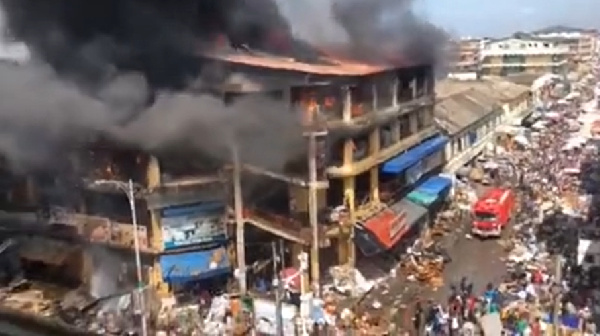Published
3 years agoon
By
Joe Pee
Monday’s inferno at the Makola market in Accra has left many people asking questions as to whether or not the Ghana National Fire Service (GNFS) was prepared to combat the blaze that ravaged goods and monies running into millions of Ghana cedis.
The GNFS Public Relations Officer is convinced that his outfit discharged their duties to the best of their abilities but for the lack of water and the weak water pressure which the Ghana Water Company Limited had to answer for.
Ellis Oko Robinson, whilst speaking on Joy FM’s Top Story programme of July 5, explained the constraints within which they carried out their response to the fire.
“We had a distress call around 10 past nine in the morning and we have been able to use nine of our tenders and one from the Armed Forces to be able to bring this fire under control,” he said.
Asked about the lack of water in water hydrants within the catchment area, he replied: “It is true but unfortunately, all the hydrants that we have in the central business district does not have the pressure required for fire fighting. So we have to rely on (Kwame Nkrumah) Circle and other adjoining communities and it’s quite far from here, so that is one challenge that we are having.
“It is very difficult for me to talk about (that). You and I know that one percent of our water bills goes to Ghana Water Company Limited, so if water company officials are here, they can answer that,” he said.
When the station got the Ghana Water Company Limited, GWCL’s, PRO onto the programme, Stanley Martey also mounted a defense over how his outfit was doing its utmost best against resource constraints.
Martey put the challenge down to the high demand for water in the Makola area as against inadequate supply hence the low pressure, but he is quick to add that the failure to combat the Makola fire had nothing to do with water pressure.
“I think apart from the Makola area, there are other hydrants within the metropolis so that if you don’t have enough water in Makola, they could fall on other hydrants close by. The challenge is that we don’t have enough water in Accra.
“There is a gap between demand and supply and Makola lies at the center of our distribution mains and if you look at the population around that area you could tell that by the time water gets to even the Makola area, pressures may have reduced.
“And so they have known for a very long time that pressures are not that high within the Makola enclaves….. I don’t think that water was their challenge,” Martey stressed.
He then offered an advice to the GNFS to always be combat ready with filled tenders.
“Since they have hydrants within their offices, they should always be combat ready. Even if the hydrant in your offices is not functioning effectively, then get the tender filled from the nearest place and be combat ready,” Stanley Martey said.
Back to the GNFS PRO, he admitted that the fire engine serving Makola had broken down but that the non functionality did not in any way affect their response to the inferno.
Asked about the allegation that they arrived late to the scene due to logistical constraints, he said: “I disagree, because the first tender that came here, came in time. If they had called us at the 6:30 when the fire started we would have been able to douse it.”
“The fire started at 6:30 meanwhile we came here at 10 past nine, look at the time difference. So we cannot be blamed, we only came in to assist,” he added.
Meanwhile traders have since yesterday been counting their losses with one perfumery operator telling the Ghana News Agency that she had lost as much as half a million Ghana cedis in the incident.


Video: Burna Boy Surprises Aide King Manny with 2024 Tesla Cybertruck for the Holidays


Video: Lady Amazed by Lagos Street Hawker’s Suit-and-Tie Attire, Sparks Online Buzz


Cheddar Dismisses Rumors About Voting Allegations, Calls for Electoral Reforms


Video: Brake Failure Sparks Multi-Vehicle Collision Near Tesano-Papaye, Involving Bishop Salifu Amoako’s Car


Parliament Begins Registration Process for 9th Parliament Members-Elect


“Farming Is My Life”: President-Elect John Mahama Shares Post-Politics Ambitions


Bank of Ghana to Auction $120M for Bulk Oil Distribution in Q1 2025 to Stabilize Fuel Supply


Man arrested over death of woman set on fire on New York subway


Ghana and Nigeria play out pulsating draw in CHAN qualifier

























